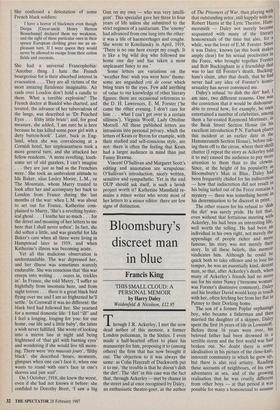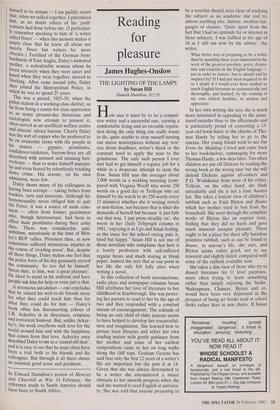Bloomsbury's discreet man in blue
Francis King
THIS SMALL CLOUD: A PERSONAL MEMOIR by Harry Daley Weidenfeld & Nicolson, £12.95 Through J.R. Ackerley, I met the now dead author of this memoir, a former London policeman, in the Sixties. I even made a half-hearted effort to place his manuscript for him, proposing it to (among others) the firm that has now brought it out. The objection to it was always the same: as Colin Haycraft of Duckworth put it to me, 'the trouble is that he doesn't dish the dirt'. The 'dirt' in this case was the fact that, through Ackerley — met by chance in the street and at once recognised by Daley, an enthusiastic theatre-goer, as the author of The Prisoners of War, then playing with that outstanding actor, still happily with us, Robert Harris at the Lyric Theatre, Ham- mersmith — Daley not merely became acquainted with many of the literarY homosexuals of the time but also, for a while, was the lover of E.M. Forster. Since it was Daley, known (as this book makes amply clear) for his sexual proclivities in the Force, who brought together Forster and Bob Buckingham in a friendship that was to last till Forster's death, Bucking- ham's claim, after that death, that he had never had any idea of Forster's homo- sexuality has never convinced me. Daley's refusal 'to dish the dirt' had, I am sure, two different reasons. One was the conviction that it would be dishonour- able to reveal how, for example, he once entertained a number of celebrities, among them a fur-coated Raymond Mortimer, in the Beak Street Section House (in his excellent introduction P.N. Furbank places this incident at an earlier date in the Hammersmith Section House), before tak- ing them off to the circus, where their shrill chatter (I repeat the story as Ackerley told it to me) caused the audience to pay more • attention to them than to the clowns. Since, at the height of his popularity as Bloomsbury's Man in Blue, Daley had been frequently chided for his indiscretion how that indiscretion did not result in his being turfed out of the Force rernainsa mystery — there was something heroic in his determination to be discreet in print. The other reason for his refusal to 'dish the dirt' was surely pride. He felt that, even without that fortuitous meeting with Ackerley, his had been an interesting life, well worth the telling. He had been an individual in his own right, not merely the appendage of people richer and more famous; his story was not merely their story. In all these beliefs, this memoir vindicates him. Although he could be quick both to take offence and to lose his temper, he was an essentially kind, decent man, so that, after Ackerley's death, when many of Ackerley's friends had no more use for his sister Nancy (`tiresome woman, was Forster's dismissive comment), DaleY and his brother David would keep in touch with her, often fetching her from her flat in Putney to their Dorking home. The son of a former Poplar orphanage boy, who became a fisherman and then married the daughter of a skipper, DaleY spent the first 16 years of life in Lowestoft. Before those 16 years were over, his beloved father had been drowned in a terrible storm and the first world war had broken out. No doubt there is some idealisation in his picture of the close-knit, innocent community in which he grew up, but there is also real artistry. Reading these accounts of neighbours, of his own adventures at sea, and of the growing realisation that he was cruelly different from other boys — at that period it was possible for many a homosexual to assume himself to be unique — I am guiltily aware that, when we talked together, I patronised him, as no doubt others of his 'posh' contacts had done before me. (I particular- ly remember speaking to him of 'a writer called Ibsen' — when this memoir makes it amply clear that he knew all about not merely Ibsen but writers far more obscure.) Terrified of the German bom- bardment of East Anglia, Daley's widowed mother, a redoubtable woman whom he loved intensely when they were apart and hated when they were together, moved to Dorking. After some menial jobs, Daley then joined the Metropolitan Police, in which he was to spend 25 years. This was a period, 1925-50, when the police station in a working-class district, so far from being a centre for class oppression as so many present-day historians and sociologists now attempt to present it, often served as an unofficial welfare centre and citizens' advice bureau. Clearly Daley was the sort of copper who far preferred to be on avuncular terms with the people in his manor — gypsies, prostitutes, confidence-tricksters, barrow-boys are all described with amused and amusing ben- evolence — than to make himself unpopu- lar and even feared by relentlessly tracking down crime. His arrests, on his own admission, were few. Daley shows many of his colleagues as having been corrupt — taking bribes from bookies, tarts and motorists. Although his homosexuality never obliged him to quit the Force, it was a source of snide com- ment — often from former guardsmen who, though heterosexual, had been in effect male prostitutes during their army days. There was considerable anti- semitism, notoriously at the time of Mos- ley's BUF rallies. Prisoners then, as now sometimes suffered mysterious injuries in the course of 'evading arrest'. But, despite all these things, Daley makes one feel that the police force of his day genuinely served the community. So too did he himself. Street duty, to him, was 'a great pleasure'. He liked to stand in his uniform and have people ask him for help or even just a chat.
A strenuous autodidact — one concludes that he valued his well-to-do friends more for what they could teach him than for what they could do for him — Daley's book often has disconcerting echoes of Ackerley in its directness, crispness and irreverent humour. But, unlike Acker- ley's, his work overflows with love for the world around him and with the happiness that comes from that love. Ackerley once described Daley to me as a 'cussed old dear', and it is easy to see that he must often have been a trial both to his friends and his colleagues. But through it all there shines an essential good sense and goodness.



















































 Previous page
Previous page